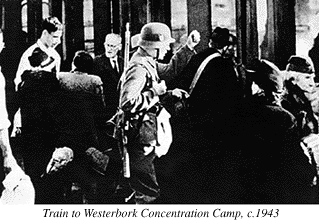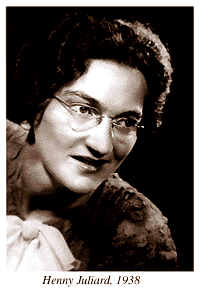
Henny Juliard and her husband Pam were living in The Hague at the outbreak of World War Two in Holland. Henny lost her job as a department store office manager in June, 1941. She was dismissed by the Germans for being Jewish. Pam stayed in his business until he was no longer able to work because of the escalating anti-Jewish German decrees: a victim of the Nazi plan to destroy the economic livelihood of the Dutch Jews.During the war Henny was in regular contact with her friend Annie, whom she had first met in 1933, when both young women had been in a sanatorium for several months, recovering from tuberculosis. Since then Annie had become a pharmacist. She lived in Amsterdam until 1941, when she and Bert Bochove married and settled in the small town of Huizen.
 HENNY JULIARD: In 1942, the Jewish people in Holland got invitations from the Germans asking us to please be so kind as to show up at the train station so they could take us away to the concentration camps. We told ourselves, "If they find us, so be it, but go on our own? Never."
HENNY JULIARD: In 1942, the Jewish people in Holland got invitations from the Germans asking us to please be so kind as to show up at the train station so they could take us away to the concentration camps. We told ourselves, "If they find us, so be it, but go on our own? Never."
Before our particular invitation arrived, my husband Pam and I moved away; we went to live in The Hague with my brother. But then he and his family got the famous letter, and went into hiding, and we had to move again. Someone had given us the address of a very nice old lady--a Socialist--also living in The Hague. She took us in. But there were other people staying in her house as well, one of them a Dutch man who was working for the German army. We were in her house only two days when this man said to the old lady, "Those people are Jews. You'd better get rid of them or I will go to the Germans about it." I immediately phoned my friend Annie Bochove, and that same day she came to get me, and took me to her home in Huizen.
Pam felt that since the Bochove's were newly married, he would find a different place for himself; he didn't want to cause any extra trouble for Annie and Bert; one of us was enough. With the help of a friend he found an address in Rotterdam, but his stay there ended in a tragic drama.
By 1942, everyone needed false papers, but not many people knew how to arrange for them; that came later, with the so-called Resistance. To supply identity cards, Pam's Rotterdam friend was in the practice of stealing them from other people's pocketbooks. One day a woman caught him in the act, and yelled for the police. He was so afraid he would be tortured and betray his secrets, before the police could even arrest him, he shot himself. But the policeman--this was a Dutch policeman; I'm telling this story to show that some Dutch people had a very bad attitude--found a receipt in his pocket that led him to a mattress shop, and there the police learned where he had lived. Searching his home, they discovered lists with names and addresses of people in hiding, including those of Pam, Pam's sister, and my brother, who was married to Pam's sister.

Return to the: